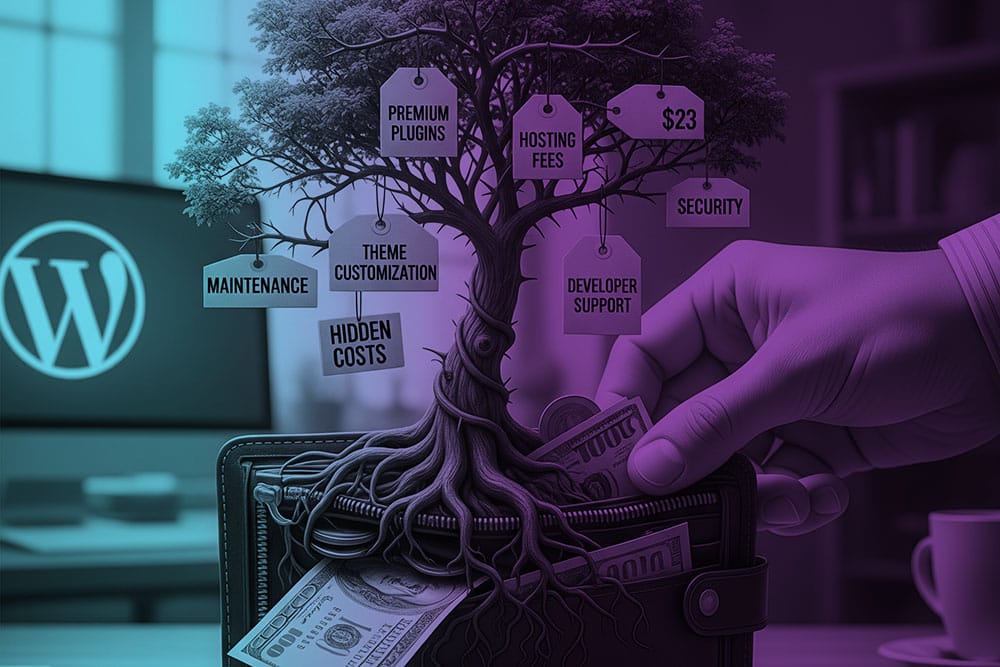
The Hidden Costs of WordPress: What to Budget for in 2025
Beyond “Free” – The Real Price of Running WordPress
When most business owners and creators hear “WordPress,” they think of a free, easy-to-use platform. And while it’s true that WordPress itself is open-source, the reality in 2025 is that running a professional, secure, and competitive WordPress website comes with costs many first-timers overlook.
From premium themes to security add-ons and performance optimization, hidden costs can creep up quickly if you’re not prepared. Knowing what to budget ahead of time helps you avoid unpleasant surprises—and ensures your site runs smoothly.
1. Domain Registration and Hosting
Your domain name is your digital address. While domain registration can seem inexpensive at first (usually $10–$20 per year), premium domains or renewals can cost much more.
Then comes hosting—the backbone of your site. Shared hosting may seem attractive at $5/month, but serious businesses often need managed WordPress hosting or cloud hosting for better speed and reliability. Expect to budget anywhere from $20 to $50 per month for managed WordPress hosting in 2025.
High-intent keywords used: managed WordPress hosting, WordPress website costs, cloud hosting for WordPress
2. Premium Themes and Custom Design
While free WordPress themes exist, they usually lack customization, security updates, and support. Premium themes often cost $60–$100 upfront, with additional yearly renewal fees.
For businesses aiming for a unique brand identity, hiring a developer or designer adds another layer of investment—custom WordPress design projects can range from $2,000 to $10,000+ depending on complexity.
3. Essential Plugins and Add-Ons
Plugins extend WordPress functionality, but not all of them are free. Security plugins, SEO tools, backup services, and advanced contact forms often require premium subscriptions.
Here are common plugin-related costs in 2025:
- SEO plugins (Yoast SEO Premium, Rank Math Pro): $50–$100/year
- Security plugins (Wordfence, iThemes): $99–$200/year
- Backup & migration tools: $80–$150/year
Long-tail keyword used: best WordPress plugins for business websites
4. Security and Maintenance Costs
Cybersecurity is more critical than ever. Hackers constantly target WordPress sites, especially outdated ones. Ongoing security monitoring and maintenance are hidden costs many businesses forget.
Options include:
- DIY updates (time-consuming)
- Hiring a professional maintenance service ($50–$200/month)
If you skip this budget line, you may pay much more later recovering from downtime or hacks.
5. Website Speed and Performance Optimization
A slow site hurts SEO and conversions. To keep your WordPress site fast in 2025, you may need:
- Content Delivery Network (CDN) – $10–$20/month
- Caching tools – $50–$150/year
- Image optimization plugins – $50/year
Optimizing your site isn’t optional anymore—Google’s Core Web Vitals heavily influence rankings.
6. E-Commerce and Business Features
Running WooCommerce or other e-commerce integrations introduces extra costs:
- Payment gateway fees (2.9% + $0.30 per transaction on average)
- Premium WooCommerce extensions ($50–$300 each)
- Advanced shipping calculators or tax automation tools
If you plan to sell online, these costs should be part of your WordPress website budget.
7. Marketing, Analytics, and Growth Tools
To compete online, you’ll likely need:
- Email marketing tools ($20–$100/month)
- Advanced analytics dashboards
- CRM or lead capture tools
While not strictly “WordPress costs,” these integrations are part of running a successful site.
8. Time, Training, and Professional Help
Perhaps the most underestimated hidden cost of WordPress is your time. Learning how to manage plugins, update content, troubleshoot errors, or improve SEO can take hours every week.
Hiring professionals—designers, developers, SEO specialists—may save time but adds ongoing expenses. Budgeting for expert help ensures your site stays competitive without draining your productivity.
Plan Ahead—Invest Smart in Your WordPress Future
WordPress remains one of the most flexible and powerful platforms in 2025, but “free” isn’t the full story. Domains, hosting, themes, plugins, maintenance, and marketing tools add up quickly.
The key is preparation. By budgeting realistically for these hidden WordPress costs, you set your website—and your business—up for long-term success. Instead of being caught off guard, you’ll make smarter financial decisions and ensure your digital presence works for you, not against you.









